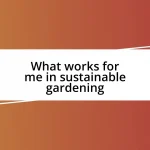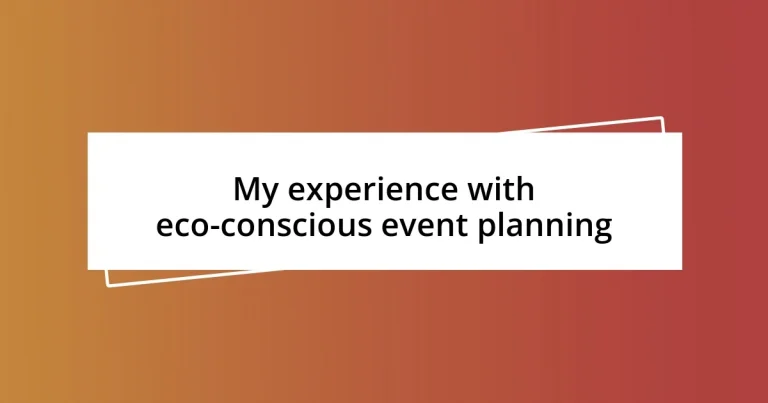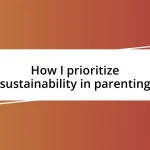Key takeaways:
- Eco-conscious event planning involves minimizing waste, sourcing local and sustainable materials, and fostering meaningful experiences that resonate with guests’ environmental values.
- Engaging with green vendors and selecting eco-friendly venues enhance the event’s sustainability efforts while creating positive community connections and guest experiences.
- Implementing waste reduction strategies, like promoting reusable containers and utilizing digital solutions, can significantly decrease waste and inspire broader cultural changes around sustainability.
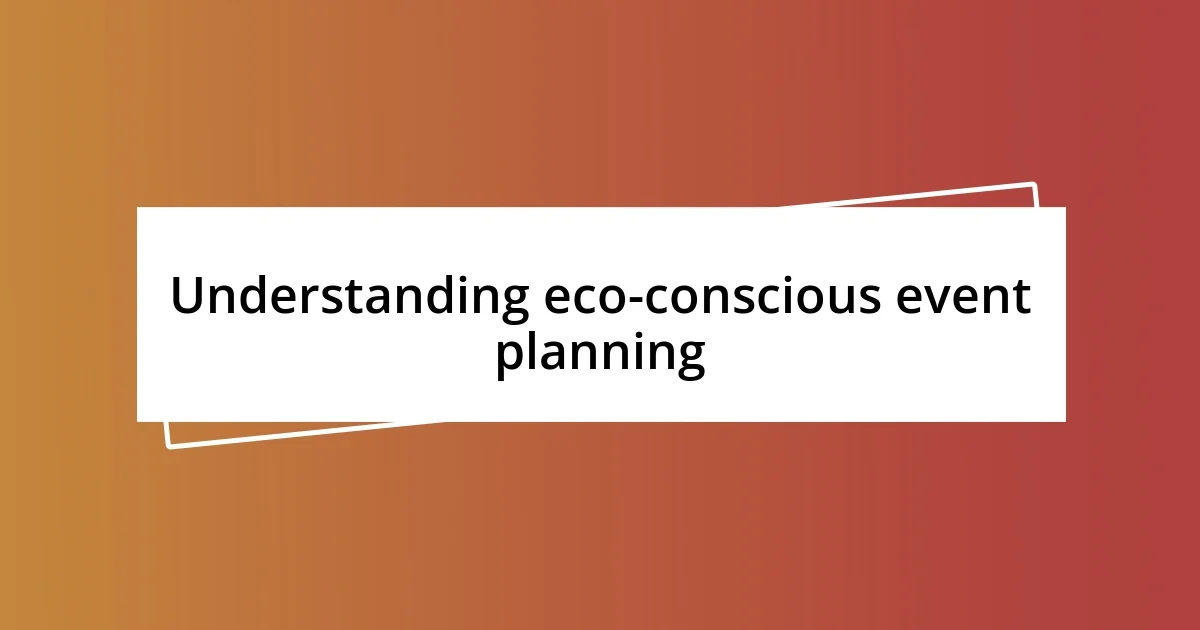
Understanding eco-conscious event planning
Eco-conscious event planning is all about making mindful choices that minimize environmental impact. I remember one event I organized where we opted for digital invitations instead of paper ones. This simple switch not only cut down on waste but also sparked conversations about sustainability among our guests—an unexpected bonus!
When I think about eco-conscious planning, it goes beyond just reducing waste. It’s also about creating an experience that resonates with environmental values. For example, I once collaborated with a local caterer who sourced all ingredients from nearby farms. Seeing the joy on guests’ faces while they enjoyed fresh, seasonal dishes was truly rewarding. Have you ever considered how the food at your event can reflect your values? It’s remarkable how even a meal can weave sustainability into the fabric of the occasion.
Ultimately, understanding eco-conscious event planning requires creativity and a dedication to making better choices. I’ve often asked myself, “What footprint do I want my event to leave behind?” This mindset drives me to explore unique alternatives, from eco-friendly décor to zero-waste initiatives. It’s not only about doing good for the planet; it’s about inspiring others to think about their own impact, and that’s where the real magic happens.
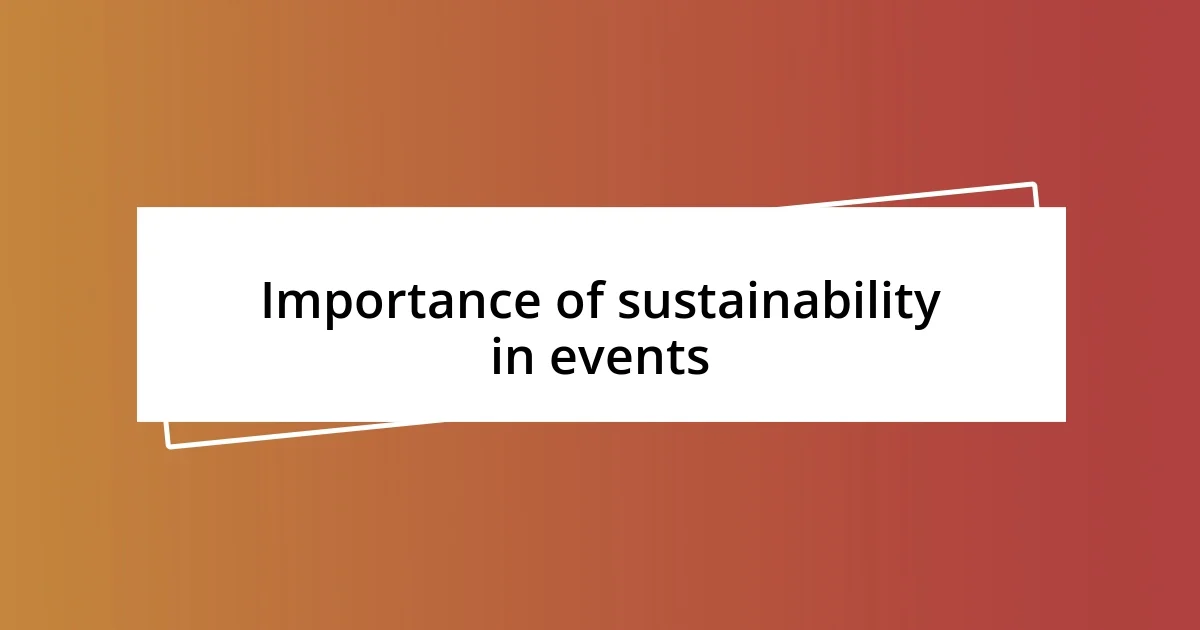
Importance of sustainability in events
Sustainability in events is crucial because it not only reduces the environmental impact but also fosters a sense of community and shared values. I recall a community festival I helped organize where we prioritized sustainability. It wasn’t just about recycling; we invited local artisans and farmers to showcase their products, creating a vibrant marketplace that connected people with their local ecosystem. That day was filled with laughter and learning, and I could feel the positive energy as attendees began to truly appreciate the importance of supporting their environment.
Here are some key reasons why sustainability is important in event planning:
- Environmental impact: Reduces waste and conserves resources, minimizing the event’s carbon footprint.
- Community connection: Engages local businesses and promotes regional economies.
- Positive branding: Enhances the reputation of the organization or individual hosting the event.
- Guest experience: Creates meaningful experiences that resonate with guests’ values, encouraging them to be more conscious in their own lives.
- Long-term benefits: Encourages responsible practices that can lead to lasting positive change in the industry.

Selecting eco-friendly venues
Selecting the right venue can make or break your eco-conscious event, and I’ve learned this through my personal experiences. For instance, I once booked a venue that was designed with sustainability in mind. It was equipped with solar panels and rainwater harvesting systems. Not only did it feel good to know I was supporting a space dedicated to the environment, but my guests were equally impressed by the venue’s dedication to sustainability. It enhanced their overall experience, and I could see them appreciating the effort we made to choose thoughtfully.
When scouting for venues, I strongly recommend looking for those with eco-certifications. These are often indicators that the venue has implemented sustainable practices. I remember visiting a charming location that boasted energy-efficient lighting and organic landscaping. It hit me that even the ambiance contributed to a greener planet. So, when evaluating a space, it’s crucial to ask questions about its environmental initiatives. Are they using local materials? What’s their waste management system like? These aspects reflect a venue’s commitment to sustainability.
Choosing an eco-friendly venue often means thinking outside the traditional options. I once opted for an outdoor space surrounded by nature for an event. The natural setting not only minimized the need for excessive decorations but also provided a stunning backdrop that spoke for itself. It’s incredible how nature can enhance an event’s atmosphere; I witnessed guests feeling more connected to their surroundings, sparking conversations about the beauty of our planet. This balance between aesthetics and sustainability resonated deeply with everyone and reinforced my belief that eco-friendly choices create memorable experiences.
| Criteria | Considerations |
|---|---|
| Eco-Certifications | Look for venues with recognized sustainability certifications to ensure they uphold eco-friendly practices. |
| Energy Use | Check if the venue utilizes renewable energy sources, like solar power or energy-efficient lighting. |
| Local Sourcing | Find out if the venue sources materials and services locally to support the surrounding economy. |
| Waste Management | Inquire about the waste disposal processes and if they offer recycling and composting options. |
| Ambiance | Consider venues that embrace natural beauty to reduce the need for additional decorations. |
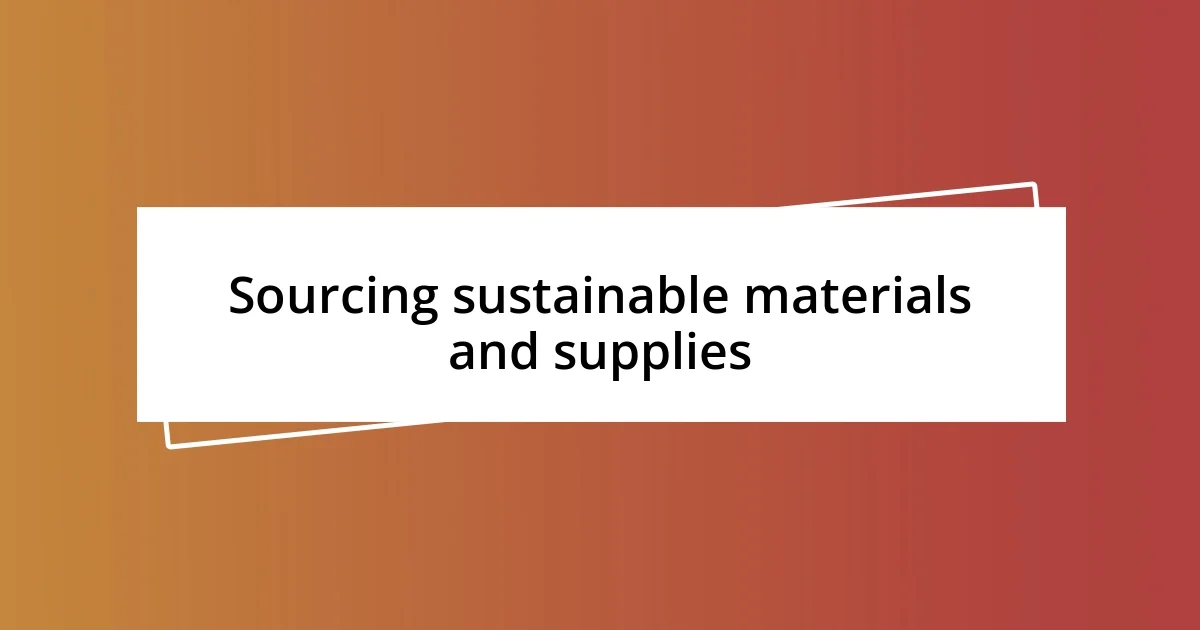
Sourcing sustainable materials and supplies
Sourcing sustainable materials and supplies is one of the most rewarding aspects of eco-conscious event planning. I remember preparing for a wedding and wanting to ensure that every element reflected our commitment to sustainability. I reached out to local vendors who specialized in biodegradable decorations and organic flowers. The excitement of collaborating with artisans who shared my values made me feel connected to a larger movement towards environmental responsibility.
It’s fascinating how the choice of materials can transform an event. For a recent charity gala, I specifically sourced recycled paper for our invitations. When I delivered them, I was struck by how much love and care went into every design. I could practically hear my guests’ surprise when they learned the invitations weren’t just beautiful—they were eco-friendly, too. Wouldn’t it be wonderful if more people understood the impact of their choices on the environment? I know my event guests left with a sense of inspiration, eager to think sustainably in their own lives.
I’ve also found that sourcing local supplies not only lessens carbon footprints but builds community bonds. At a recent community fair, we worked with a nearby bakery that used organic ingredients. The smell of freshly baked goods filled the air, creating a warm and inviting atmosphere. I could see families enjoying treats that supported local farming. It’s these moments I cherish, where the act of choosing sustainable materials turns into a memorable experience. Isn’t it incredible how the right choices can genuinely touch hearts?

Engaging with green vendors
Engaging with green vendors has been a pivotal part of my eco-conscious event planning journey. I remember the thrill of discovering a floral supplier who not only provided stunning arrangements but also operated with a completely sustainable approach. Their commitment to using locally grown, organic flowers made my heart swell. It’s a beautiful thing—supporting businesses that prioritize the planet while enhancing the aesthetic of my events.
While collaborating with green vendors, I prioritize communication. During one event, I engaged with a caterer who emphasized plant-based cuisine. Initially, I worried about my guests’ preferences, but their enthusiasm for creating a vibrant, flavorful menu eased my concerns. I recall the moment guests began to rave about dishes like roasted vegetable tart and quinoa salad. It was a revelation to see everyone enjoying food that was not only delicious but also planet-friendly. Have you ever witnessed people surprised by how satisfying and delightful eco-friendly options can be? I have, and it reinforces my belief that sustainability can be incredibly appealing.
I’ve learned that consistency in values fosters stronger partnerships. For my last conference, I worked with a company that specializes in providing compostable event materials, from plates to cutlery. Our shared vision created a buzz among attendees, who appreciated that even the smallest details were thoughtfully considered. I still smile when I think about how guests engaged in conversations about reducing waste—they really felt part of something bigger. Engaging with green vendors isn’t just about the products; it’s about forging connections that spark broader discussions on sustainability. Isn’t that what we all aim for in creating meaningful experiences?
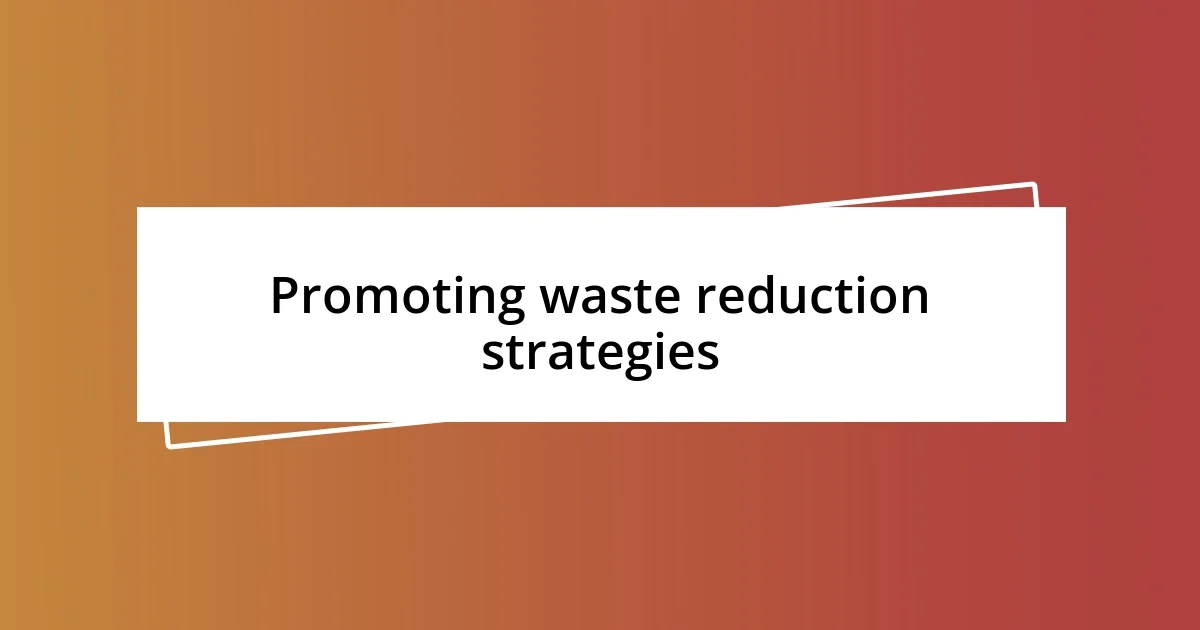
Promoting waste reduction strategies
Implementing waste reduction strategies has been a game changer in my event planning experiences. I recall coordinating a community picnic where we set up a “Waste-Free Zone.” It was exciting to see attendees actively participate in education sessions about sorting their garbage into compost, recycling, and waste. When I witnessed a child eagerly explaining the difference between biodegradable materials and regular trash, I felt a sense of accomplishment. It’s moments like these that truly inspire me to continue promoting awareness around waste.
One method I found effective is encouraging guests to bring their reusable containers for leftovers. At a recent farewell party, I suggested this approach and was pleasantly surprised by the response. Not only did we dramatically reduce food waste, but attendees also enjoyed the idea of taking home a delicious reminder of the event. It dawned on me that such small shifts in behavior can create ripple effects. Have you ever noticed how simple actions can lead to broader cultural change? I certainly have, and it motivates me to keep pushing for innovative waste reduction practices.
Incorporating digital solutions is another strategy I’ve embraced. For an outdoor festival, instead of traditional flyers, we employed an event app that provided all necessary information. It amazed me to see how easily people engaged with this tech-savvy approach. Guests not only appreciated the reduction of paper waste but also enjoyed real-time updates and interactive features. Isn’t it fascinating how technology can bridge sustainability with convenience? This experience reinforced my belief that modern innovations can effectively support waste reduction goals and add value to any event.
